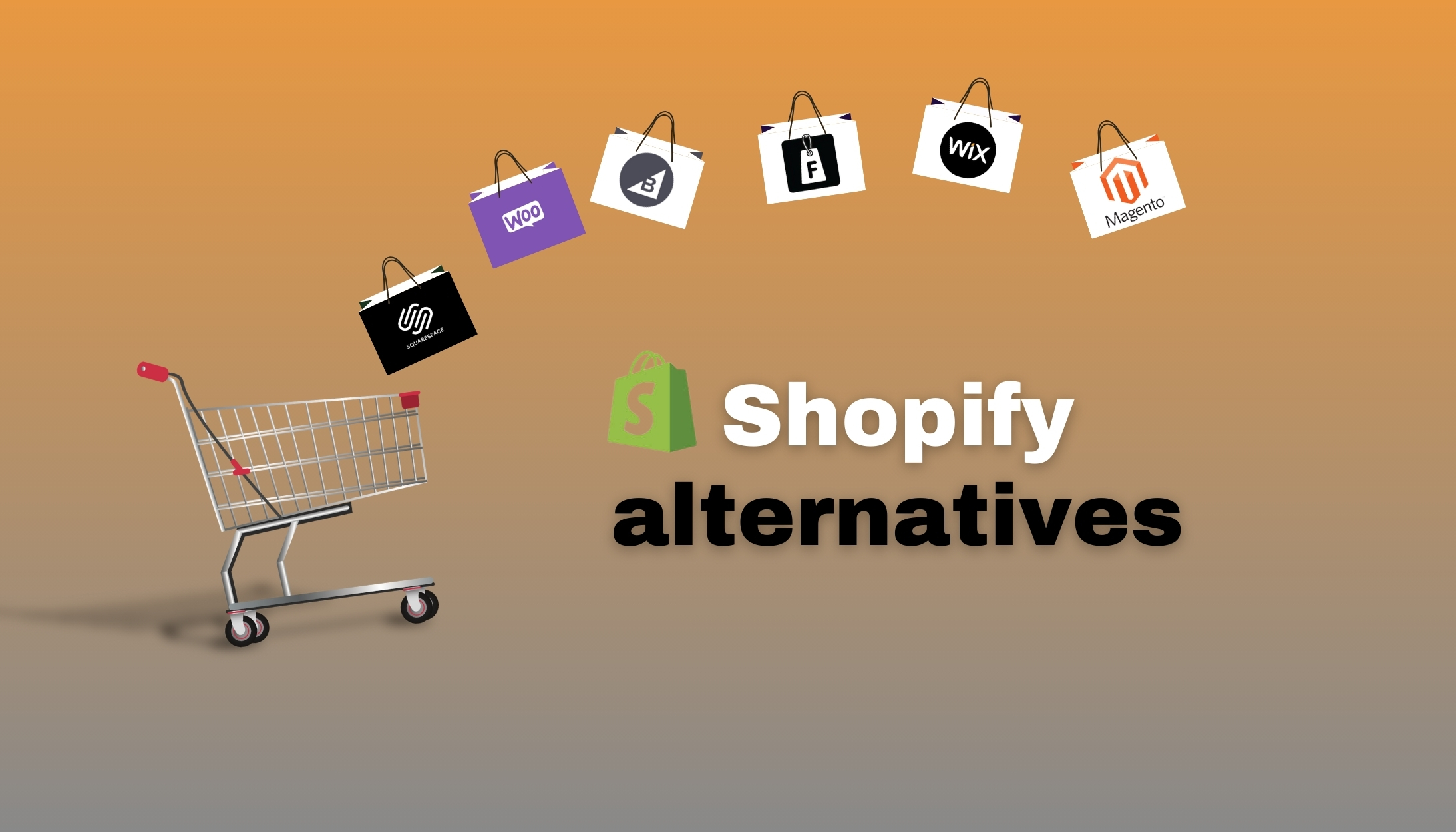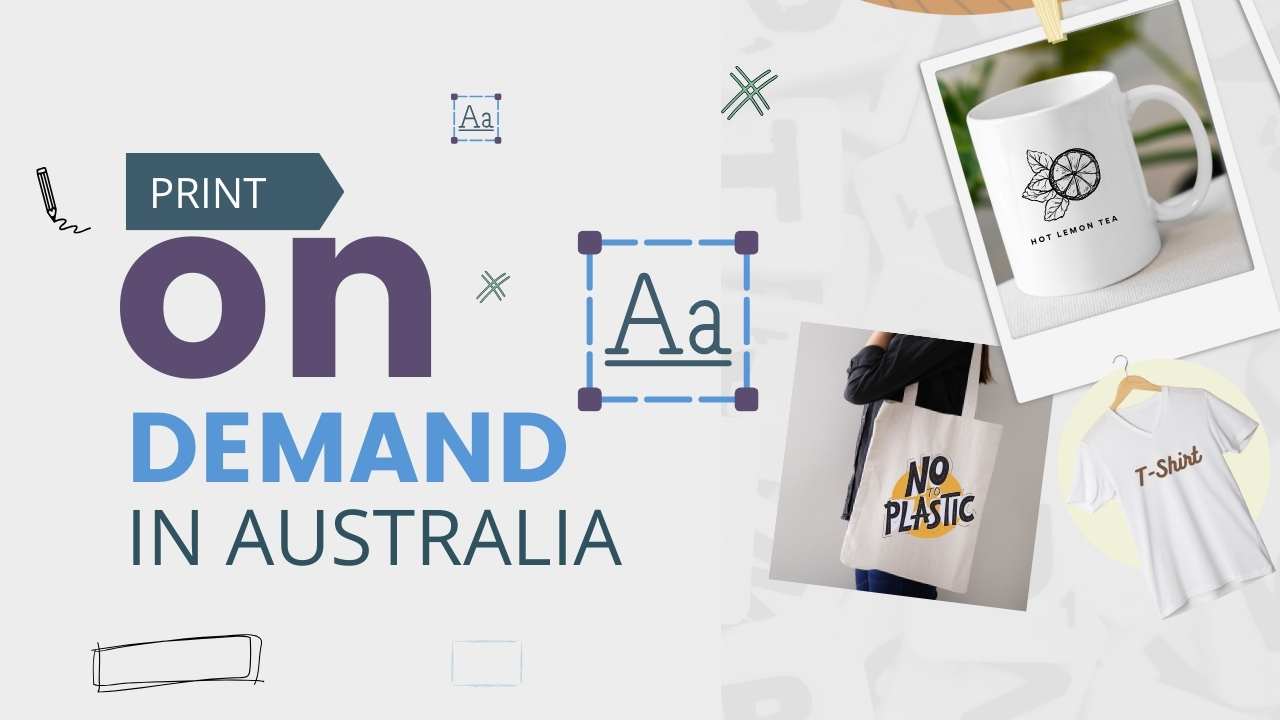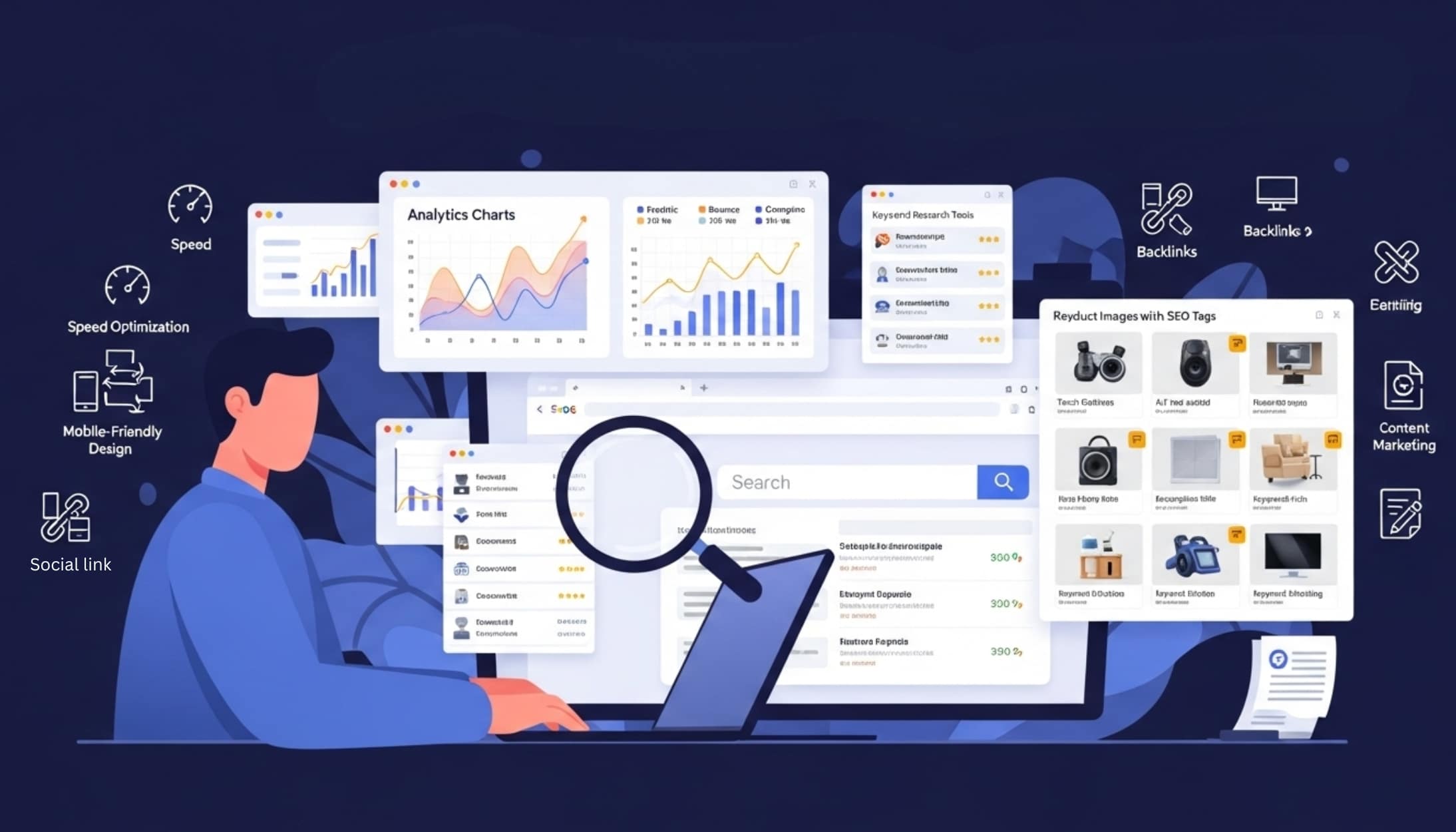Table of Contents
Introduction
Shopify alternatives are a hot topic for many online business owners looking for a platform that better suits their needs. While Shopify is a popular and robust e-commerce solution, it might not be the best fit for everyone due to factors like pricing, customization limitations, or specific business requirements. In this blog, we’ll explore some of the top alternatives to Shopify, highlighting why you might consider switching and what features to look for in a new platform. Whether you’re just starting out or looking to grow your online store, there’s a perfect alternative out there for you.What is Shopify?
Shopify is a leading e-commerce platform that provides businesses with the tools they need to create and run their online stores. It’s popular because it offers a range of features such as customizable templates, secure payment processing, inventory management, and marketing tools. However, despite its robust capabilities, Shopify may not be the ideal solution for every business. Let’s know why.4 Reasons Why You’re Probably Looking for a Shopify Alternative
1. High Costs
Shopify’s pricing structure can be quite steep, especially for small businesses. The basic plan starts at $29 per month, but if you need more advanced features, you’ll need to opt for higher-tier plans, which can be expensive. Additionally, the cost doesn’t stop there. Many essential apps and plugins come with their own monthly fees, adding to your overall expenses. If you choose not to use Shopify Payments, you’ll also incur transaction fees on every sale, which can significantly eat into your profits. This makes it challenging for small businesses to manage their budgets effectively while trying to scale.2.Limited Customization
While Shopify offers a variety of templates to get you started, customization can be limited if you don’t have coding skills. The platform’s flexibility is somewhat restricted, meaning that for any significant changes or unique design elements, you might need to hire a developer. This not only adds to your costs but can also slow down the process of getting your store exactly how you want it. For businesses looking to create a highly personalized shopping experience, these limitations can be a significant drawback.3.Transaction Fees
One of the more frustrating aspects of Shopify is the transaction fees it charges on sales unless you use their proprietary payment gateway, Shopify Payments. These fees can range from 0.5% to 2% per transaction, depending on your plan. For businesses with high sales volumes, these fees can accumulate quickly and substantially reduce your profit margins. Even if you prefer to use another payment gateway for its features or lower fees, Shopify’s additional transaction fees make this choice less appealing.4. Scalability Issues
As your business grows, you may find that Shopify’s scalability options are either limited or prohibitively expensive. While Shopify does offer more advanced plans to handle higher traffic and sales volumes, these plans come with a much higher price tag. This can make it difficult for businesses to scale efficiently and affordably. Additionally, the lack of flexibility in Shopify’s infrastructure can make it challenging to implement custom solutions or integrations that growing businesses might need.Features You Should Consider on Your Next E-commerce Platform
When you’re searching for a new e-commerce platform, there are a few key features you definitely want to keep in mind. Let’s break it down:1. Ease of Use
You want a platform that’s super easy to use. Setting up your store should be a breeze, not a headache. Look for something with an intuitive interface, like drag-and-drop builders and clear navigation. This way, you can spend more time growing your business and less time figuring out how to make things work.2. Cost-Effectiveness
Budget is always a big deal, right? Make sure the platform you choose offers transparent pricing with no hidden fees. It should give you great value for your money, especially for the features that matter most to your business. Check that the pricing structure fits your budget, and watch out for extra costs that can sneak up on you.3. Customization and Flexibility
Your store should reflect your brand’s unique vibe. That means you need a platform that lets you customize everything easily. Look for one with a variety of templates and design options. You shouldn’t need a degree in coding to make your store look awesome. This flexibility helps your store stand out and evolve as your brand grows.4. Integration with Payment Gateways
Offering a smooth checkout experience is key. Make sure your platform integrates seamlessly with various payment gateways. This not only gives your customers more choices but can also help you save on transaction fees. A good platform will support multiple gateways, making it easy to manage transactions without any hassle.5. Shipping Options
Shipping can be a real pain, so look for a platform with comprehensive and affordable shipping solutions. It should offer integrated options with clear pricing and reliable delivery. The ability to manage shipping rates, print labels, and track shipments right from your platform is a huge plus. Also, see if they have partnerships with major carriers for discounts.6. Customer Support
When things go wrong, you need help fast. Choose a platform with accessible and knowledgeable customer support. Look for options like live chat, email, and phone support. Good customer support can make all the difference when you’re stuck and need quick solutions.7. Scalability
Think about the future. Your platform should grow with your business. It should handle increased traffic and sales without slowing down or costing a fortune. Look for a platform that offers easy upgrades, new features, and integrations as you expand. This ensures that your platform can keep up with your business now and in the future.6 Great Shopify Alternatives
Here are six excellent alternatives to Shopify, with FatherShops leading the pack:1. FatherShops
FatherShops is an all-in-one e-commerce platform designed to cater to dropshipping businesses. It combines ease of use, affordability, and robust features, making it an ideal alternative to Shopify.- Ease of Use: FatherShops offers an intuitive interface with a drag-and-drop theme builder (Ai Website Builder), making it easy for anyone to set up a store without technical knowledge.
- Cost-Effectiveness: At a very affordable price, FatherShops provides a comprehensive plan with no hidden fees,offering exceptional value for money.Know more about Fathershops’ pricing here.
- Customization: The advanced theme builder allows extensive customization without needing coding skills, giving you the freedom to create a unique store that reflects your brand.
- Payment Integration: FatherPay, FatherShops’ secure and cost-effective payment solution, eliminates transaction fees and simplifies payment processing.
- Shipping: FatherShipment offers global reach with transparent pricing, reliable delivery, and easy tracking, ensuring a smooth shipping experience for your customers.
- Customer Support: FatherShops provides 24×7 dedicated support, ensuring you get the help you need whenever you need it.
2. WooCommerce
WooCommerce is a powerful WordPress plugin that transforms your website into a fully functional online store. It’s highly customizable and ideal for those already familiar with WordPress.- Flexibility: Offers extensive customization options through a wide range of plugins and themes.
- Cost-Effective: The core plugin is free, but costs can add up with premium extensions and hosting.
- Scalability: Suitable for businesses of all sizes, from small startups to large enterprises.
3. BigCommerce
BigCommerce is a robust e-commerce platform designed to support businesses of all sizes. It offers advanced features, excellent scalability, and no transaction fees.- Ease of Use: User-friendly interface with powerful built-in tools.
- Customization: Extensive design and functionality customization options.
- Integration: Supports multiple payment gateways and shipping options without transaction fees.
4. Magento
Magento is a highly flexible and scalable e-commerce platform ideal for large businesses. It offers advanced customization and a wide range of features, but requires technical expertise.- Customization: Unmatched flexibility with extensive customization options.
- Scalability: Can handle large-scale businesses and high traffic volumes.
- Cost: The open-source version is free, but development and hosting can be expensive.
5. Squarespace
Squarespace is known for its stunning templates and ease of use. It’s a great choice for small businesses and creatives who want to showcase their products with beautiful, customizable designs.- Design: Offers visually appealing templates and easy customization.
- Ease of Use: Simple to set up and manage.
- Cost: Affordable pricing plans with essential e-commerce features included.
6. Wix
Wix provides a simple and user-friendly platform for building an online store. It offers a range of templates and easy customization options, making it suitable for small businesses and beginners.- Ease of Use: Drag-and-drop builder makes it easy to create a store.
- Customization: Offers a variety of templates and design flexibility.
- Cost: Competitive pricing with various plans to suit different needs.
Choose FatherShops as Your Alternative
FatherShops stands out as the ultimate Shopify alternative, especially for dropshipping businesses. Here’s why:- All-In-One SolutionFatherShops is designed to make your life easier. Imagine not having to juggle multiple apps or subscriptions just to keep your store running. With FatherShops, everything you need is bundled into one comprehensive package. From setting up your store to managing payments and shipping, it’s all integrated seamlessly. This way, you can focus on what really matters – growing your business.
- Seamless IntegrationIntegrating various services can be one of the biggest headaches in e-commerce. FatherShops takes this stress away with its seamless integration of payment and shipping solutions.
- FatherPay: This secure, cost-effective payment solution eliminates transaction fees and the hassle of card limits and verification.
- FatherShipment: Offers global shipping with transparent pricing, reliable delivery, and easy tracking. These integrations ensure your customers have a smooth shopping experience, which keeps them coming back for more.
- Customer-Centric SupportHave you ever faced an issue with your online store and struggled to get timely help? With FatherShops, that’s a thing of the past. They offer 24×7 dedicated customer support, ensuring you get the help you need, when you need it. Whether it’s a technical issue or a simple question, the support team is always there to assist you quickly and efficiently.
- Cost-EffectiveFatherShops offers a pricing structure that’s straightforward and free of hidden costs. You get all the essential features you need to run your store, including payment processing and shipping solutions, bundled into one comprehensive package. This approach ensures you receive great value for your money, helping to significantly improve your bottom line without unexpected expenses.
- ScalabilityAs your business grows, you need a platform that can grow with you. FatherShops is built to support businesses of all sizes, ensuring you have the tools you need at every stage of your growth. The ability to upgrade seamlessly as your needs evolve is essential for your growth strategy.



 Integrated Supplier Network
Integrated Supplier Network



